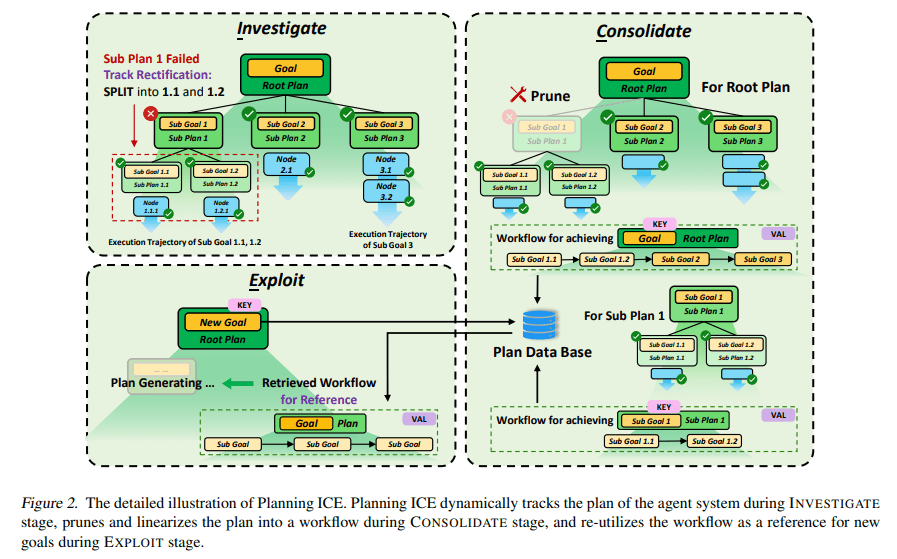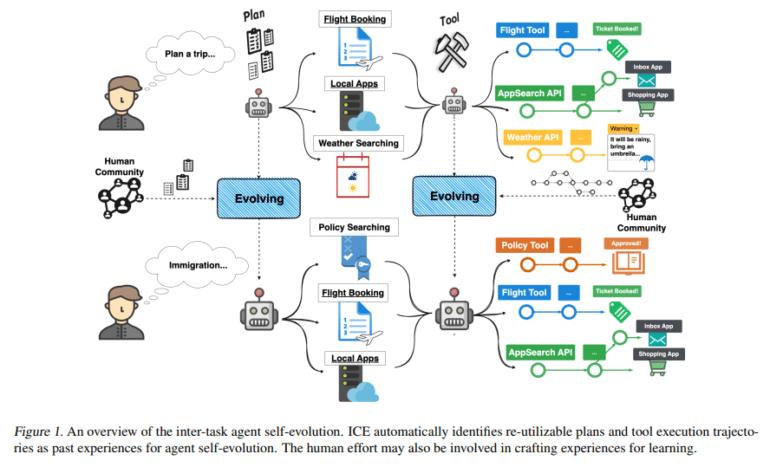TL;DR:
- The ICE strategy represents a revolutionary approach in AI and machine learning.
- Intelligent agents now possess the ability to adapt and evolve by integrating past experiences into new tasks.
- Efficient management and execution of diverse tasks are central challenges in AI agent development.
- ICE methodology includes three critical stages: Investigation, Consolidation, and Exploitation.
- ICE strategy reduces model API calls by up to 80%, enhancing computational efficiency.
- This innovation lowers barriers to deploying advanced agent systems.
- It significantly enhances agent task execution efficiency and adaptability to new tasks.
- The ICE strategy has profound implications for the future of AI and intelligent agent development.
Main AI News:
A groundbreaking shift is unfolding within the realm of artificial intelligence and machine learning, where intelligent agents are now equipped with the remarkable ability to seamlessly adapt and evolve by amalgamating past experiences into novel and diversified tasks. These intelligent agents, positioned at the forefront of AI technology advancement, are meticulously engineered to efficiently execute tasks, perpetually learn, and consistently enhance their adaptability across an array of scenarios.
Central to this domain’s challenges is the efficacious management and execution of a myriad of tasks by these agents. This encompasses not only the execution of intricate actions but also the pivotal integration of past knowledge into new contexts. The proficiency to execute this transformation effectively empowers agents, enabling them to excel in immediate tasks while equipping them with the foresight and aptitude to confront future challenges more effectively.
Historical approaches in agent technology have predominantly relied on harnessing voluminous datasets and intricate algorithms. These methodologies strive to endow agents with the capability to process vast troves of information, make judicious decisions grounded in data-driven insights, and apply these acquired insights to analogous future tasks. However, this approach often necessitates substantial computational resources and calls for a more streamlined approach to leverage past experiences.
The introduction of the Investigate-Consolidate-Exploit (ICE) strategy, spearheaded by researchers from Tsinghua University, The University of Hong Kong, Renmin University of China, and ModelBest Inc., signifies a watershed moment in the development of intelligent agents. Employing the innovative XAgent framework, this strategy heralds a reimagining of how agents evolve and acquire knowledge over time. It places a profound emphasis on imbibing insights from fresh data and proficiently harnessing past experiences. The ICE methodology comprises three pivotal stages: Investigation to discern valuable past experiences, Consolidation to render these experiences readily applicable in forthcoming tasks, and Exploitation to unleash their potential in new scenarios.
During the Investigate phase, the spotlight is cast upon identifying experiences harboring potential value for future tasks. This phase entails an in-depth analysis of the agent’s historical actions and outcomes, meticulously selecting experiences deemed worthy of preservation for future reference. The Consolidate stage assumes a pivotal role as it standardizes these experiences into accessible formats that can be seamlessly employed in new task scenarios. The final Exploitation stage involves the practical application of these consolidated experiences to new tasks, augmenting the agent’s efficiency and overall effectiveness.
A standout characteristic of the ICE strategy is its remarkable ability to reduce model API calls by an astonishing 80%. This substantial reduction signifies a quantum leap in computational efficiency, a critical factor for implementing agent systems in real-world applications. Moreover, this strategy mitigates reliance on the intrinsic capabilities of models, effectively lowering the barriers to deploying advanced agent systems.
In-depth insights gleaned from this research encompass:
- The ICE strategy’s pioneering approach to learning significantly enhances agent task execution efficiency.
- A notable decrease in computational resource utilization, evidenced by the reduction in model API calls, underscores marked improvements in time efficiency.
- Agents exhibit enhanced adaptability when faced with new tasks, effectively capitalizing on past experiences to elevate their performance.
- The potential ramifications of this strategy on the future of AI, particularly in the domain of intelligent agent development, are profound.

Source: Marktechpost Media Inc.
Conclusion:
The introduction of the ICE strategy marks a pivotal moment in the evolution of AI agent development. Its ability to improve efficiency, reduce resource reliance, and enhance adaptability has the potential to revolutionize the market for intelligent agent systems. As businesses increasingly seek agile and efficient AI solutions, the ICE strategy is poised to play a transformative role in shaping the future of AI technologies.

